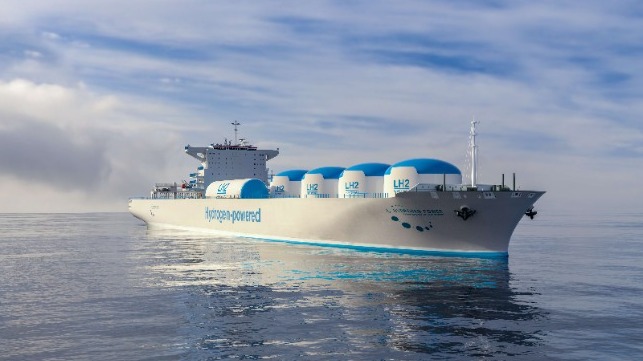NGOs and Industry Leaders Call for Minimum H2 Standard in FuelEU Regs

Viking Cruises, Transport & Environment, Siemens and other leading maritime businesses and NGOs have called on the EU to require a minimum share of hydrogen in the industry's fuel mix by 2030.
The proposal would modify the EU's proposed FuelEU Maritime alternative-fuel plan by adding a "dedicated e-fuels subquota" equivalent to six percent sustainable and scalable hydrogen.
"Sustainable e-fuels are currently too expensive compared to other alternatives such as fossil LNG and biofuels, holding back investments in production facilities, refueling infrastructure in ports and zero-emission ships," said Delphine Gozillon, sustainable shipping officer at T&E. "However, with a bit of a push e-fuels produced from renewable hydrogen can be scalable. That’s why we need a quota to get the ball rolling."
In addition to the minimum six percent threshold, the coalition called for a "multiplier" credit for any extra voluntary hydrogen fuel use. This would allow every tonne of additional e-fuel to count fivefold, creating more market demand for hydrogen. The proposal aligns with a plan that T&E and other NGOs issued in February.
The group also called for targets for the construction of hydrogen-based fuel bunkering infradstructure in European ports in order to ensure availability.

that matters most
Get the latest maritime news delivered to your inbox daily.
The dozens of signatories to the proposal include prominent players in maritime technology and energy, including T&E, Yara, Siemens, Alstom, CIP, Ballard Power Systems and Cummins, among others.
FuelEU Maritime has attracted strong reactions from across the industry. The Union of Greek Shipowners, ECSA and ICS have called for the scheme to regulate bunker fuel suppliers; ECSA seeks a guarantee that revenues from FuelEU Maritime will be spent on sustainable maritime fuels; the World Shipping Council would like for FuelEU Maritime to be limited in geographic scope to Europe only; T&E is concerned that the regulation will drive uptake of less-sustainable biofuels and fossil LNG; and many, including ESPO, have called for better alignment between FuelEU Maritime and other EU climate regulations.
